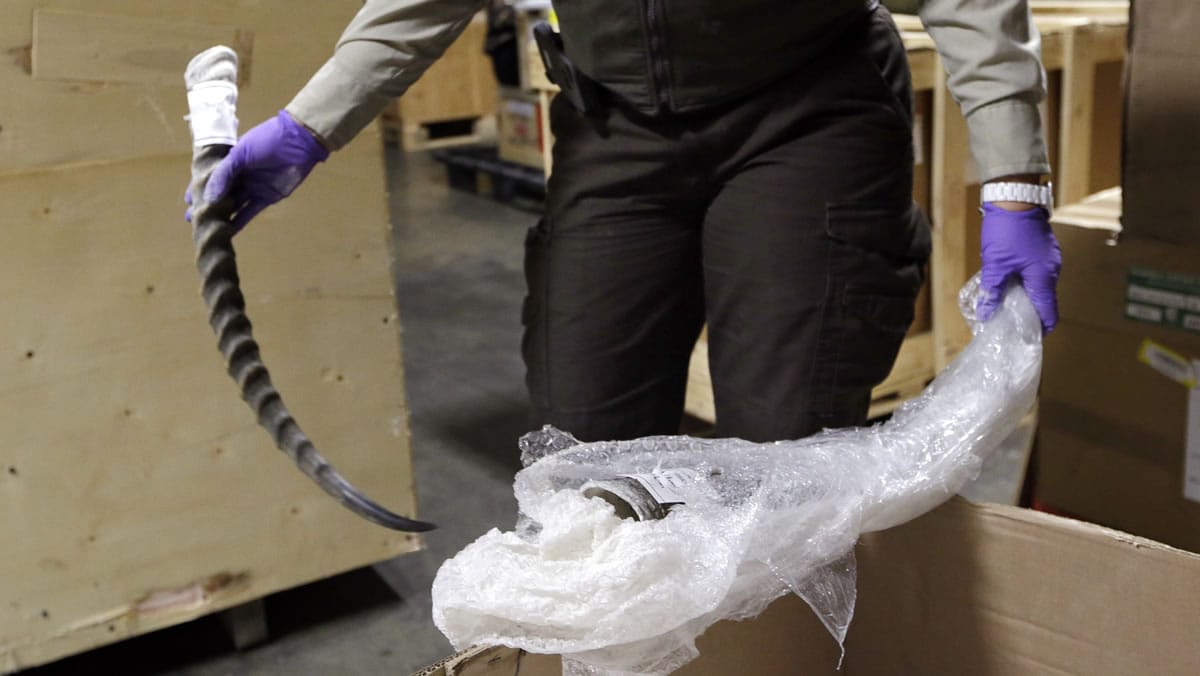OLYMPIA — Importing items like elephant ivory or rhino horns into the United States for commercial purposes has been prohibited for decades under federal law and international treaties. In Washington, voters will weigh in on a ballot measure that would add state penalties to violators and expand the number of animals prohibited for trade.
The measure on November’s ballot would ban the purchase, sale and distribution of parts or products made from 10 endangered animals: lions, elephants, rhinos, tigers, leopards, cheetahs, marine turtles, pangolins, sharks and rays. Offenders could face a maximum penalty of five years in prison and a $10,000 fine.
Initiative 1401 is backed by billionaire Paul Allen and supported by the Humane Society of the United States and conservation and zoological groups. It is the first statewide vote on wildlife trafficking, though states like California, New York and New Jersey have enacted less sweeping legislation. Supporters of the issue in Oregon announced Monday that they are planning a measure similar to Washington state’s to appear on the November 2016 ballot.
Critics argue such measures will do little to help reduce poaching if other countries and states continue allowing sales of ivory products. But supporters argue that Washington can serve as a model for other states.
“In the broadest sense, we are part of a global campaign to protect elephants, rhinos and other endangered animals and we’re working at the international, national and state level, because the crisis is so urgent,” said Wayne Pacelle, president and CEO of the Humane Society of the United States. “It needs to be a multipronged war. The states have a role to play.”
More than two dozen bills in 19 states and the District of Columbia were introduced relating to wildlife trafficking bans this year, including in Washington and Oregon, but most died, National Conference of State Legislatures said. Earlier this month, California Gov. Jerry Brown signed a bill banning the importing, buying or selling of elephant ivory and rhino horns, ending the previous exemption in the state that allowed selling ivory imported before 1977.
New Jersey and New York also have laws banning the sale of ivory and rhino horns, with some exceptions.
There are a handful of exemptions in the Washington state measure, including antiques or musical instruments where an endangered animals makes up less than 15 percent of the item; animal parts or products distributed for educational, scientific or museum purposes; and items that are passed on through a will or estate. However, for antiques to be considered exempt, they would need documentation of provenance and proof that the item is at least 100 years old.
Stuart Halsan, an antique collector from Centralia who is heading the opposition campaign, said that if the measure passes, many people who own historical items will find them valueless unless they have the documentation required by the initiative. Halsan said supporters of the measure are “hoping people vote with emotion, not logic.”
“They fail to demonstrate to me how taking something that is 50, 100 years old and making it valueless is going to protect an elephant today in Africa,” he said.
The Washington measure comes as there has been a pronounced focus on poaching and ivory. Earlier this year, President Barack Obama announced measures to stem the trade of ivory, building on previous restrictions. Last month, Obama and Chinese President Xi Jinping announced an agreement on their goal to implement a near-complete ban on commercial ivory trading.
Data from the University of Washington’s Center for Conservation Biology estimates that, as many as 50,000 elephants are killed annually, based on the amount of African elephant ivory seized.
U.S. Fish and Wildlife inspectors charged with making sure the federal law is followed when shipments arrive at the airport, ports or border, encounter everything from mounted heads from big game hunts to dead snakes.
Fish and Wildlife spokesman Brent Lawrence said that the agency had 45 seizures in Washington state last year, though the bulk were due to incorrect paperwork or discrepancies in permits, not because they were prohibited under federal law.
Supporters, citing documents they received under a public records request to U.S. Fish and Wildlife, note that about 50 illegal items, ranging from elephant ivory jewelry to elephant skulls were intercepted in Washington over a four-year period starting in 2010. The records show that while fines were involved in some of the cases, there was no jail time.
By prohibiting trade at the state level, I-1401 creates a class C felony, with sanctions that could result in a maximum penalty of five years in prison and $10,000 fine for items $250 or higher. Those with less valuable items would be charged with a gross misdemeanor, and face jail time of up to a year and a fine of up to $5,000.



